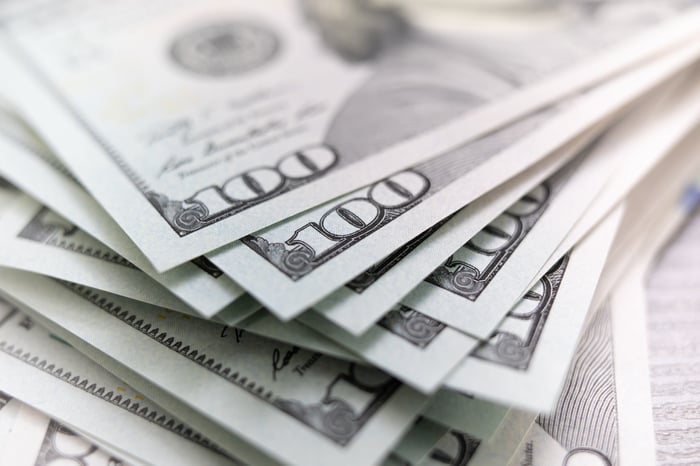Investing in the stock market over the past 14 months hasn't been for the faint of heart. All three major U.S. stock indexes fell into a bear market in 2022 and produced their worst full-year returns since 2008.
However, certain sectors, industries, and types of stocks have a history of outperforming when volatility and uncertainty pick up. Dividend stocks are a perfect example.
Companies that regularly provide a payout to investors are almost always recurringly profitable and, in many instances, time-tested. These are businesses that have shown Wall Street they have the tools and intangibles to navigate a challenging economic environment and emerge stronger on the other side.

Image source: Getty Images.
Income stocks also have time on their side. Based on a detailed report released 10 years ago from J.P. Morgan Asset Management, a division of money-center bank JPMorgan Chase, publicly traded companies that initiated and grew their payouts between 1972 and 2012 generated an annualized return of 9.5%. Comparatively, publicly traded companies with no payout produced a meager annualized return of 1.6% over the same 40-year period.
The biggest dilemma for income investors is balancing greed with reason. Dividend investors want the highest yield possible, but also little or no risk to their principal investment. Unfortunately, risk and yield tend to correlate. Put another way, stocks with really high yields can be more trouble than they're worth.
But this isn't always the case. What follows are three ultra-high-yield dividend stocks -- a term I'm using to describe stocks with yields of at least 7% -- that have sustained upside catalysts and make for no-brainer buys in March.
Innovative Industrial Properties: 8.77% yield
The first high-octane dividend stock that jumps out as an amazing deal for opportunistic income seekers is cannabis-focused real estate investment trust (REIT) Innovative Industrial Properties (IIPR -0.26%), which is better known as IIP. IIP purchases medical marijuana cultivation and processing facilities and seeks to lease these properties out for 10 to 20 years.
As you'll see from IIP's chart, its share price has been clobbered since the start of 2022. While some of this retracement has to do with investors being less willing to pay a premium for high-growth REITs during a bear market, much of the concern surrounding IIP relates to a recent rise in rental delinquencies. After consistently collecting 100% of its rents on time, IIP announced on Jan. 19 that it had collected 92% of its rental payments in January on time.
To be clear, delinquencies aren't a good thing, and I'm certainly not trying to sweep this negative under the rug. But all REITs eventually face delinquencies -- and it's how those businesses work with delinquent tenants that determine whether these speed bumps merit worry. All indications at the moment are that IIP will successfully rework its leases or shift delinquent leases to new multi-state operators (MSOs).
One of the more interesting things about the U.S. cannabis industry is that its products are primarily treated as nondiscretionary goods. In other words, consumers continue to buy pot products no matter how poorly the U.S. economy performs. This bodes well for IIP's long-term operating model and the need for future production and processing capacity.
Additionally, Innovative Industrial Properties' entire portfolio is triple net leased. A triple net lease requires the tenant to cover all associated property costs, such as utilities, maintenance, property taxes, and insurance. While triple net leases reduce the rental income IIP nets from its tenants, it also, importantly, removes surprise costs from the equation.
Lastly, IIP actually benefits from marijuana remaining illegal at the federal level. As long as cannabis is federally illicit, MSOs will have limited access to basic banking services. Innovative Industrial Properties works with cash-needy MSOs by purchasing facilities for cash and immediately leases those properties back to the seller. This sale-leaseback program is a win-win for both parties.
PennantPark Floating Rate Capital: 11.07% yield
The second ultra-high-yield dividend stock that's a no-brainer buy in March is little-known business development company (BDC) PennantPark Floating Rate Capital (PFLT 0.86%). Following more than seven years of dishing out a $0.095/share dividend each month, PennantPark's board recently authorized a 5% increase to its payout (now $0.10/share). This payout boost has lifted PennantPark's yield to north of 11%.
BDCs are companies that invest in either the equity (common and preferred stock) or debt or middle-market companies. A middle-market company has a micro-cap or small-cap (sub-$2 billion) valuation. For PennantPark, 13% of its portfolio ($152.8 million) is tied up in common and preferred equity, while the remainder ($998.2 million) is put to work in secured debt.
Buying and holding middle-market company debt comes with an assortment of advantages for PennantPark Floating Rate Capital. For one, the yields on the debt it holds are well above average. Since middle-market businesses are often unproven, their access to debt and credit markets are limited.
Secondly, PennantPark's entire debt portfolio consists of variable-rate investments. With the Federal Reserve having no choice but to aggressively combat historically high inflation with rate hikes, every increase in interest rates is leading to more income from the company's debt portfolio. Over the trailing-15-month period, ended Dec. 31, PennantPark's weighted-average yield on debt investments climbed from 7.4% to 11.3%. And remember: The nation's central bank isn't done hiking rates.
The third key aspect of PennantPark's debt investment portfolio is its composition. All but $100,000 of the company's $998.2 million debt investment portfolio is first-lien secured debt. If one of the companies PennantPark invests in seeks bankruptcy protection, first-lien secured debt holders are first in line to be paid. Choosing to invest in first-lien secured debt, as well as spreading its investments across 126 companies (this figure also includes common and preferred-equity investments), substantially de-risks the company's portfolio.
Anytime PennantPark Floating Rate Capital can be purchased for less its generally accepted accounting principles (GAAP) net asset value, which is currently $11.30/share, it makes for a surefire buy.

Image source: Getty Images.
Alliance Resource Partners: 13.66% yield
The third ultra-high-yield dividend stock that's a no-brainer buy in March is energy stock Alliance Resource Partners (ARLP -0.26%). This coal producer has raised its dividend for six consecutive quarters and is on track to pay a 13.7% yield in 2023.
Admittedly, some investors aren't going to be thrilled with the idea of putting their money to work in a coal company. For a decade, all we've heard about are how solar panels, hydrogen fuel cells, wind power, electric vehicles, and other green-energy projects are going to change our planet for the better. But that was before two major events threw a monkey wrench into the global energy supply chain.
Last year, Russia invaded Ukraine. When that happened, Europe's energy supply needs became unpredictable. Worse yet, energy companies around the world were forced to reduce their capital investments because of the COVID-19 pandemic.
Three years of reduced investment has made it virtually impossible to quickly increase crude oil supply. The industry that's stepped up and met supply needs is coal. Not surprisingly, coal prices per ton have soared, which is a boon for the entire industry.
While it's great to see Alliance Resource Partners benefiting from a higher per-ton sales price, the best thing about this company is that it locks in volume and price commitments up to four years in advance. Based on the midpoint of management's coal production guidance this year (37 million tons), the company has 94% of its production committed and priced for 2023. It has another 64% committed and priced for 2024, assuming the production midpoint doesn't change next year.
The point is that Alliance Resource Partners' operating cash flow is highly predictable, which is what gives management the confidence to outlay capital for expansion projects, acquisitions, and to increase the company's distribution for six consecutive quarters.
Beyond coal, Alliance Resource Partners also owns oil and natural gas royalties. If the spot price for crude oil remains elevated because of the aforementioned broken energy supply chain, the expectation would be for this royalty segment to generate healthy earnings before interest, taxes, depreciation, and amortization (EBITDA).
Coal stocks aren't going to knock your socks off in the growth department, but you'll struggle to find a cheaper stock (3.5 times Wall Street's forecast earnings for 2023) with a higher yield (13.7%) than Alliance Resource Partners.





